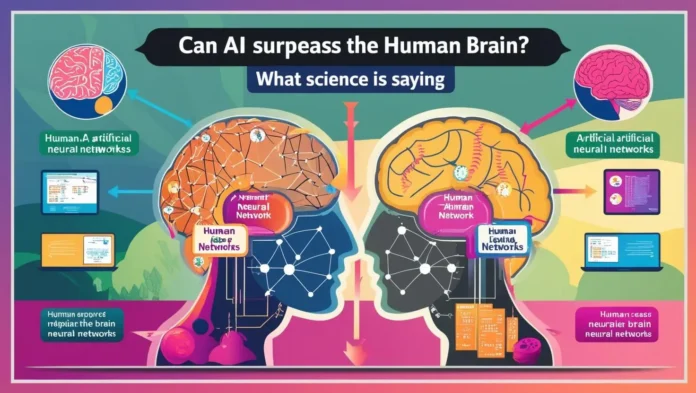Contents
- 1 Can AI Surpass the Human Brain? Let’s Start With the Big Picture
- 2 The Human Brain: A Masterpiece Still Unmatched
- 3 AI’s Advantages: Speed, Scale, and Pattern Recognition
- 4 What Experts Say About AI vs. Human Intelligence
- 5 Real-World Applications: Where AI Surpasses — and Falls Short
- 6 Thought Experiment: What If AI Could Feel?
- 7 A Partnership, Not a Rivalry
- 8 Internal & Outbound Links
Can AI Surpass the Human Brain? Let’s Start With the Big Picture
Can AI surpass the human brain — not just in speed or memory, but in actual intelligence and understanding? That’s the question driving scientists, tech leaders, and ethicists to rethink what it means to be intelligent. As AI continues to evolve, the line between machine learning and human cognition is becoming increasingly blurred.
From voice assistants completing our sentences to AI systems passing medical exams, the progress is undeniable. But how close are we to reaching — or surpassing — the human brain’s incredible capacity?
The Human Brain: A Masterpiece Still Unmatched
The human brain weighs about 1.4 kilograms, yet processes an estimated 11 million bits of information per second. It creates meaning, feels emotions, adapts with intuition, and reshapes itself through neuroplasticity. No computer, no matter how fast, can currently replicate the depth and flexibility of biological thought.
The real challenge in surpassing the human brain lies not in processing power, but in replicating the emergent consciousness, morality, and creativity that defines us.
AI’s Advantages: Speed, Scale, and Pattern Recognition
AI thrives where humans falter:
- It works 24/7 without fatigue
- It learns from vast datasets in seconds
- It detects patterns humans miss
- It automates routine and analytical tasks
Still, AI lacks emotional intelligence, self-awareness, and contextual nuance — all of which are crucial in making decisions that aren’t just “correct,” but also wise. So, while many believe AI can surpass human capabilities in narrow tasks, whether it can truly surpass the human brain overall remains open to interpretation.
What Experts Say About AI vs. Human Intelligence
Futurist Ray Kurzweil predicts that artificial general intelligence (AGI) will emerge by 2029 — capable of surpassing human-level thinking. Meanwhile, scholars like Christof Koch argue that without consciousness, intelligence is incomplete.
Geoffrey Hinton, a pioneer in deep learning, warns that we might soon build systems we don’t fully understand. Academic studies agree: AI lacks key human faculties like empathy, ethical judgment, and moral reasoning — a major roadblock to true equivalence.
Real-World Applications: Where AI Surpasses — and Falls Short
AI has already outperformed humans in areas like:
- Image and speech recognition
- Game playing (Go, Chess, Starcraft)
- Analyzing legal documents
- Early disease detection
However, AI systems are often vulnerable to:
- Biased data
- Misinterpretation of context
- Inability to handle ambiguity
For example, an AI might identify tumors in X-rays better than radiologists — until it encounters a slight variation not seen in its training data. This brittleness shows why can AI surpass the human brain isn’t just about raw results — it’s about adaptability and reliability, too.
Thought Experiment: What If AI Could Feel?
Imagine an AI that writes novels, paints with purpose, feels regret, and learns from personal experience. Would it have surpassed us, or simply replicated our output?
The question isn’t just how smart AI can get — it’s what kind of intelligence matters. Consciousness, empathy, lived experience — these aren’t just “features” but fundamental parts of human cognition that machines haven’t yet touched.
A Partnership, Not a Rivalry
Brain-computer interface projects like Neuralink aim to merge human intelligence with AI, creating a hybrid potential that neither alone could achieve. In that future, surpassing the human brain may no longer mean replacing it, but amplifying it.
Some experts argue that the true goal isn’t to build AI that’s better than us — but to use AI to unlock parts of the human brain we’ve never accessed before.
Internal & Outbound Links
- Related post: Prompt Engineering Explained: A Beginner’s Guide (2025 Edition)
- External reference: KurzweilAI – Future of Intelligence
